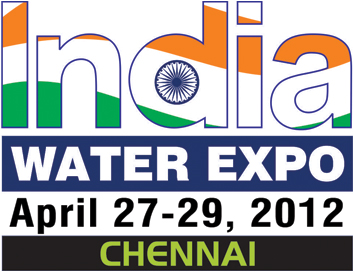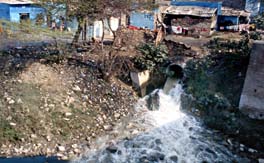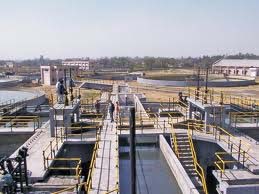/topics/wastewater-reuse-and-recycling
Wastewater Reuse and Recycling
CDD invites applications for Training on Decentralised Wastewater Treatment System, Bangalore – Apply by March 20, 2012
Posted on 13 Feb, 2012 08:25 AMConsortium for DEWATS Dissemination (CDD) Society, a not-for-profit organisation working in the field of decentralised basic need services across India.
Contextualising urban water supply in a changing environment: India Urban Conference, November 17-20 2011
Posted on 30 Jan, 2012 09:21 AMIt aimed to set the challenges faced by urban planners in the current economic, socio-political, and ecological landscape. This would enable informed and negotiated choices on urban development. The stated objectives of the conference are as follows:
India Water Expo, April 27-29, 2012, Chennai
Posted on 20 Jan, 2012 09:02 AMOrganizer: ASSOCHAM,
EverythingAboutWater
Venue: Chennai Trade Centre, Chennai

Description:
India Water Expo - the exclusive trade show on Indian Water Industry will next take place in Chennai (27-29 April, 2012). The event will showcase latest offerings in water market and help bridge knowledge gaps on water & wastewater management for users industries. As a cost effective marketing platform for key players, India Water Expo ensures that you reach your target customers in India. Manufacturers specializing in water treatment, wastewater management and all other related industries can showcase and exhibit their products and expertise.
Training program on domestic wastewater treatment & reuse, CSE, January 18-21,2012, New Delhi
Posted on 03 Jan, 2012 02:19 PMOrganization: Centre for Science and Environment (CSE)
Venue: Anil Aggrawal Green College,
Centre for Science and Environment,
38, Tughlakabad Institutional Area (Near Batra Hospital),
New Delhi- 110062
Engineers' training on “Decentralised Wastewater Treatment System”, CDD, December 5-10, 2011, Bangalore
Posted on 14 Nov, 2011 10:18 AMOrganizer: Consortium for DEWATS Dissemination (CDD) Society
Venue: Centre for Advanced Sanitation Solutions (CASS), located in Kengeri, Bangalore
![]()
The Consortium for DEWATS Dissemination (CDD) Society is working to provide one million marginalised people with access to water, sanitation and energy by 2015. From their headquarters in Bangalore, they work through a network of like minded organisations across South Asia to provide cost effective, environmentally sound, and community specific basic needs services.
Performance of sewage treatment plants - Coliform reduction - Control of urban pollution series - CPCB (2008)
Posted on 27 Oct, 2011 12:38 PMThis report presents the findings of a study conducted by CPCB with the help of Indian Institute of Technology, Roorkee and Anna University, Chennai on the performa
Decentralised treatment and recycling of domestic wastewater - An integrated approach to water management - A pilot project - CPCB (2008)
Posted on 27 Oct, 2011 10:32 AMThis report by the Central Pollution and Control Board (CPCB) describes the various intervention measures chosen to reduce the ecological footprint of the Sangamam housing project at Auroville. These measures include water harvesting, recycling and waste management.
Water and wastewater analysis – A guide manual by Central Pollution Control Board
Posted on 03 Oct, 2011 10:14 PM This guide manual on water and wastewater analysis prepared by the Central Pollution Control Board (CPCB), caters to the need of evolving a simplified code of practice for the lab
This guide manual on water and wastewater analysis prepared by the Central Pollution Control Board (CPCB), caters to the need of evolving a simplified code of practice for the lab
Revised guidelines for the centrally sponsored scheme of Common Effluent Treatment Plants (CETPs) - Ministry of Environment & Forests, 2011
Posted on 25 Sep, 2011 06:03 PM
Image courtesy: www.projectsmonitor.com
Under the Water (Prevention and Control of Pollution) Act, 1974, every industry has to provide adequate treatment of its effluents before disposal, irrespective of whether it is in stream, land, sewerage system of sea. The small scale industrial units (SSI), which are presently defined as units whose plant and machinery are valued at less than Rs. 5 crore occupy an important place in the country's economy. The SSIs are a major contributor to the total industrial pollution load of the country. However, only a small fraction of the effluent discharge from these units is estimated to be treated as on date.
Decentralized wastewater management – An overview of a community initiatives in New Delhi - Vigyan Vijay Foundation
Posted on 05 Sep, 2011 11:40 AMThis paper by Ajit Seshadri, Vigyan Vijay Foundation highlights the poor sanitation situation in India and argues that centralized approaches to wastewater treatment have had limited success and there is a need to make wastwater treatment people centric and effective through the use of decentralized systems such as DEWATS (Decentralized Wastewater Treatment Systems). DEWATS are locally organized and people driven systems that typically comprise a settler, anaerobic baffled tanks, filter beds of gravel and sand, and an open pond. The open pond or the polishing tank recreates a living environment for the wastewater to clean itself, naturally.






